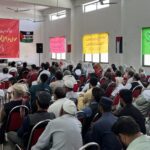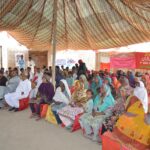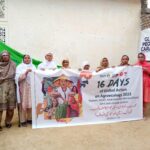
پریس ریلیز | 15 مئی 2025 پاکستان کسان مزدور تحریک(پی کے ایم ٹی ) ضلع شکارپور نے چھٹا ضلعی اجلاس شکارپور سامراجی جنگوں، قرضوں، موسمی بحران اور عدم مساوات کے خلاف عوامی محاذ عنوان سے انعقاد کیا، جس کا مرکزی موضوع “یوم نکبہ” تھا۔ اس اجلاس کا مقصد فلسطینی عوام کے ساتھ یکجہتی کا اظہار […]






